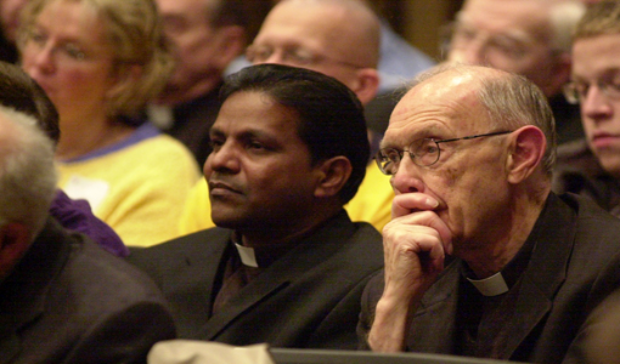Last fall Jeff Cornwall, holder of the Sandra Schulze Chair in Entrepreneurship, and Michael Naughton, director of the John A. Ryan Institute for Catholic Social Thought, addressed these questions and many more in a course titled Christian Faith and the Management Professions: An Entrepreneurial Perspective. In a shared course between Catholic Studies and the Theology Department, 20 students discussed and debated the social meaning of Christian faith and the challenges and opportunities of living an entrepreneurial vocation.
This course, along with the other faith and profession courses offered through the Center for Catholic Studies, serves as a signature, or capstone course for students by helping them integrate their liberal arts and entrepreneurship studies. By engaging in an interdisciplinary conversation between Catholic social teachings and entrepreneurship, the course takes on a mode of discourse that can be described as “middlelevel thinking” – examining the connections between revelation and reason, theory and praxis, faith and work, and virtue and technique.
One of the most important marks of a course like Faith and Entrepreneurship is the dimension of it being team taught. It was helpful for students to see a theology professor and an entrepreneurship professor (who ran his own company for many years) in front of a room discussing, debating and integrating components of Catholic social thought and entrepreneurship. This integration is difficult for a single individualto create since it requires a mastery in more than one discipline, which is why having both professors teaching together was so effective.
Throughout the semester, Cornwall, Naughton and the students explored the personaland organizational components of this integration, and how the word “integrity” comes from the Latin adjective “integer,” meaning whole, complete or the state or quality ofbeing unimpaired. Integrity depends on the ability to integrate personally those things that make people wholly consistent in themselves. Organizationally, conditions or structures are needed that allow people to become and remain whole. These aspects of integrity offered two questions which inspired the class: 1) At the level of personal integrity: What kind of person should I, as an entrepreneur, strive to become? 2) At the level of the organizational integrity: What kind of organizational community should I, as an entrepreneur, strive to build and maintain?
These questions serve as conduits to explore the deeper notion of work as vocation. Both Naughton and Cornwall believe that entrepreneurship can be a vocation. Yet they realize that within business or any other organization, the danger of reducing human mystery to human “stuff” is always present. The Catholic social tradition provides the moral and spiritual wisdom to help entrepreneurs to see their work as vocation in the deepest sense of the word.







